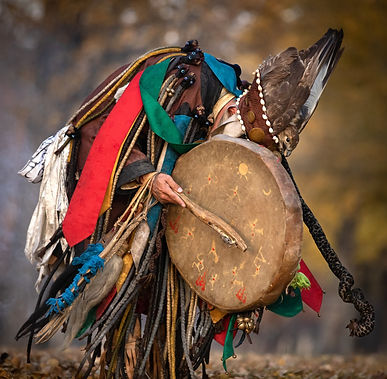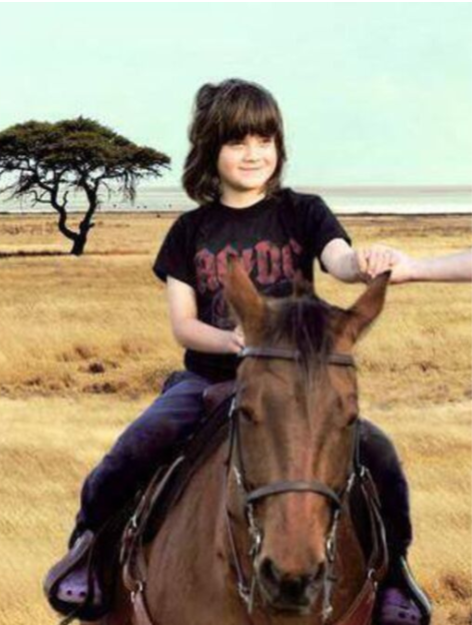Writing Projects

Abstract:
Tired of dealing with the everyday difficulties brought about by his sons autism, Rupert Isaacson finds hope in the most unexpected of places; on the back of a horse.
Written by Zoey Vlake on February 22, 2024
The Horse Boy Documentary Review:
A Journey of Acceptance and Healing
Introduction
Rupert Isaacson’s "The Horse Boy" follows a family’s breathtaking pursuit of a seemingly outlandish solution to their son’s struggle with autism. Released in 2009, "The Horse Boy" is a documentary film that provides a truly unfiltered glimpse into the struggles of raising an autistic child.
Texas Psychology professor Kristin Neff and author Rupert Isaacson go to great lengths to help their son Rowan by traveling through Mongolia on horseback seeking the foretold healing capabilities of various local shamans. As the uncontrollable tantrums and potty-training difficulties unfold so too, does the understanding and appreciation for those living with and around autism.
Through the information provided by psychology and autism experts such as Dr. Temple Grandin, a deeper emotional journey in each individual family member comes to light as their physical journey through Mongolia progresses.
Background Information
Despite having no prior film experience, Rupert Isaacson, with the help of director Michael Orion Scott, managed to take his own experiences and transform them into a compelling and educational tale. It captured the hearts of everyone at the Sundance Film Festival and earned the Feature Film Audience award in 2009.

Isaacson's two books, The Horse Boy and its sequel The Long Ride Home covered the same trip, and both became New York Times Best Sellers. As a nod to the success of both the books and the film, Isaacson started The Horse Boy Foundation, which aims to ease the dysfunctional symptoms associated with autism and other mental illnesses. The effects on Rowan shown throughout the documentary seem to be nothing short of a miracle, and there is no reason to deny the results given the family's openness about the whole experience.
"The Horse Boy Foundation, which aims to ease the dysfunctional symptoms associated with autism and other mental illnesses."
Critiques
“Kristin, his wife, seems fully in accord with him, and they’re both courageous, but I would have liked more insights from the side of her that teaches psychology" (Roger Ebert)
Autism is a very complex disorder that is often misunderstood. On his syndicated website, Roger Ebert wrote that “Kristin, his wife, seems fully in accord with him, and they’re both courageous, but I would have liked more insights from the side of her that teaches psychology.” As a professor of psychology at the University of Texas, Rowan's mother has a unique point of view that no one else in the film can share.
Temple Grandin and the other experts provide great insights on autism in general, but none of them share the same connection and understanding of Rowan personally. This void of input is most prominent when Rupert tries to explain why Rowan was improving after their first meeting with the shamans. “All I know is we went to see the shamans, and now two days later we’re seeing even more involved play that I’ve never seen before” (Isaacson, 25:22). While Isaacson does have a close enough relationship with his son to see the improvement, he lacks the knowledge and skepticism to explain the reasons behind it. The director missed a great opportunity to provide the audience with a connection between the little-known facts about autism and Rowan's real-life example through his mother.
Hippotherapy
"The term hippotherapy refers to how occupational therapy, physical therapy and speech-language pathology professionals use evidence-based practice and clinical reasoning in the purposeful manipulation of equine movement as a therapy tool to engage sensory, neuromotor and cognitive systems to promote functional outcomes" (The American Hippotherapy Association).
He is not the only one either. Many similar foundations around the world attribute the miraculous effects of Hippotherapy to the soothing rhythmic motion of a horse walking. However, every horses stride is different, which could explain why Rowan preferred some horses over others. His favorite horse, Betsy was describes as an old mare, so her strides her likely slower that the younger more wild horses that Rowan refused to ride in Mongolia.
Rowans Growth
Rowan may have improved in the long run, but his journey was not without its roadblocks. The new horses and surroundings were some of the main causes for Rowan’s difficulty adjusting at first. Living in a small town in Texas as an only child, Rowan's home was quiet and familiar. Being thrust into a new environment with constant movement and sensory-rich scenery full of bright colors and unfamiliar people, it's understandable why Rowan may have been overwhelmed at first.
These scenes were very difficult for his parents to watch, and they both wondered if what they were doing was what was best for Rowan. In the end, Kristin Neff says, “I’m open to the idea that when you take a kid, and you take them to Mongolia, and you push them to their limit; they have to confront challenges that they wouldn't otherwise, and that may be the cause of it.” Just like Kristin suggests, once Rowan gets over the initial shock of the whole situation, he is able to enjoy himself, make friends, and admire the wildlife around him.
By looking past the chaos, just as Rowan did, the audience can come to appreciate the same intricate details that director Scott displays throughout the film. One such example of this is while the family is meeting with the first group of shamans, the camera quickly cuts from the main action to a crow sitting in a tree nearby. The crow may seem meaningless, but it was an intentional shot left in the final draft for a reason.
During this scene the shamans “all concurred that a recent ancestor, a female ancestor on Kristin's side was somehow clinging to Rowan. Perhaps trying to harm him or even pull him away” (Isaacson, 18:00). As stated by Professor Daniel P Compora in an article by Lauren David, many cultures view crows as “messengers between the living and the dead.” Kristin speculates that the ancestor they are referring to is her late grandmother who suffered from depression and mania. In this situation, the crow serves as a symbol for the link between Rowan and Kristin's grandmother.
Balancing Science and Spirituality
Autism and Society
Simon Baron-Cohan, a professor of developmental psychopathology at Cambridge University says, “It’s important that we learn to live with autism, in the sense that there's a lot of adjustments our society can make to become more autism friendly.” One of the points brought up in The Horse Boy is the difference between how people with mental illnesses are treated in different parts of the world. Unlike in North America, people in Mongolia with mental illnesses are not isolated or looked down upon. Instead, they are an important part of Mongolian society and are treated as normal people equal to those in their respective fields.
This is not a carefree documentary about a magical cure for autism. While some scenes depict the family enjoying themselves and learning to accept each other, others cover very serious topics that should not be taken lightly. The Horse Boy provides an extremely up-to-close and personal glimpse into the real-life struggles of a family; covering everything from heart-wrenching tantrums to grim toilet training.
Anyone who has no problem experiencing
some uncomfortable scenes and exploring
sensitive topics such as mental health should
definitely watch "The Horse Boy."
This is not just a story about a boy with
autism, but a moving documentary that
exposes the harsh reality that those who
care for someone with autism face.
The expert inputs and unfiltered storytelling provide an excellent insight into the process of learning, understanding, and eventually accepting autism and those affected by it. This documentary reveals how little most people really know about autism. There needs to be more research and awareness surrounding mental health if society is truly going to move in a more accepting direction as Baron-Cohan suggested. Rupert Isaacson's efforts in this film and his foundation are a great start, but it is up to everyone else to educate themselves on important issues and solutions such as autism and Hippotherapy.

Had Kristin given a little more input in the film she may have mentioned the effects of Hippotherapy and how it likely played a part in Rowan's improvement. Hippotherapy is a treatment that utilizes horse riding as a therapy for children with mental and physical disabilities. Rupert Isaacson states multiple times throughout the film that “The horse was always the place where his tantrums went away.” Despite being first brought up by Hippocrates in ancient Greece, Hippotherapy didn't gain traction until the 1960's, resulting in a lot of mysteries surrounding the science behind it. Despite this, the evidence in and outside of the film was strong enough that Isaacson's whole foundation was based on the idea of horse-guided healing.

Conclusion

Given the scientific atmosphere surrounding mental illnesses, it came as a shock that the film took such a spiritual turn. Despite the heavy focus on shamanism, it is not overwhelming thanks to the informational interview segments which perfectly balance out the unexplainable.
So, was the whole point of this film to convince parents to take a trip to Mongolia to cure their children's mental illnesses? No, in fact, Isaacson makes a point to clarify that Rowan was not cured of autism. However, he did “get healed of the dysfunctions that went along with his autism. The physical and emotional incontinence, the inconsolable tantrums, and the isolation from his peers” (Isaacson, 1:28:00). Rowan's parents, as well as each of the experts, emphasize the fact that autism itself is not a bad thing, and they would never want to change who Rowan is.
"Anyone who has no problem experiencing
some uncomfortable scenes and exploring
sensitive topics such as mental health should
definitely watch The Horse Boy."


